Written on the Wind, 1956, directed by Douglas Sirk, screenplay by George Zuckerman, from the novel by Robert Wilder.
I thought that All That Heaven Allows was about as over-the-top as Sirk could get. I gravely underestimated him. The credits may claim that Written on the Wind is based on a novel by Robert Wilder, but it seems to me to be a film adaptation of the paperback rack at a low-end drugstore, circa 1956. Seriously, look at these three stills: all that's missing is the title and the Gold Medal Books logo:



As with All That Heaven Allows, the visual form fits the subject matter perfectly. Written on the Wind is not a static film about the suffocating middle classes, but a peep show of the morally depraved rich. The story was loosely based on the short life and violent death of Zachary Smith Reynolds, but Wilder moved the setting to Texas and changed the tobacco money to oil. Meet the scions of the Hadley family, world-famous for their vast oilfields and poorly-rotoscoped headquarters.
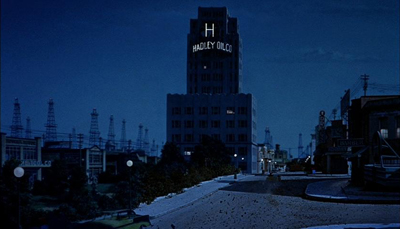
Robert Stack plays the prodigal son, Kyle. As you've probably guessed from everything you know about Sirk, it's not a particularly subtle performance. Kyle Hadley's defining characteristic is that he drinks too much. Well, there are drinkers and there are drunks. And then there are the sorts of people who cradle a bottle of corn liquor like a teddy bear:

And Kyle is actually the better of the two Hadley children. His sister Marylee is a drinker as well, but makes time to pick up working-class men out of boredom and spite. In 1956, the only thing more terrifying than a sexually aggressive woman who slept below her social class was Communism. Robert Stack sets the bar pretty high for overacting, but Dorothy Malone passes him by leaps and bounds. She's Iago in pink, dripping with contempt for everyone around her.

With those two performances, whatever the rest of the cast does seems like a waste of screen time. Rock Hudson plays Kyle's childhood friend ("Mitch Wayne," apparently because "Rock Hudson" was already taken). Mitch may be the son Mr. Hadley, Sr. always wanted, but he's pretty dull to watch. You get the impression Hudson knew he'd taken the wrong part.

Lauren Bacall doesn't fare much better as Kyle's wife Lucy. The script doesn't give her a lot of fireworks, but even so, her performance is consistently too drab for the movie she's in. It's as if she were trying to elevate the material with restraint.

To be fair, that strategy worked pretty well for Jane Wyman in All That Heaven Allows; she found an emotional center to her character and built something touching from ridiculous material. But Written On The Wind refuses to be elevated. Here's the plot, such as it is. Kyle and Mitch both love Lucy; Marylee has loved Mitch since childhood. Mitch, being Rock Hudson, has no interest in women like Marylee (slightly mannish women in grey suits, on the other hand...). So she keeps throwing herself at him and he keeps humiliating and rejecting her. After Lucy inexplicably marries Kyle, Marylee convinces her insecure brother that his wife is having an affair with Mitch. Mayhem and tragedy ensue. Stack and Malone knew exactly what kind of movie they were in, and fully, deliriously commit to their ridiculous roles. So they both got nominated for Best Supporting Actor/Actress Oscars and Hudson and Bacall got nothing.
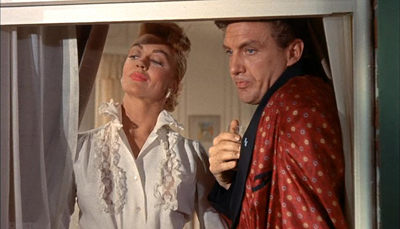
Sirk made them work for their nominations, though. When Robert Stack isn't staggering around drunk, he has this creepy dead-eyed stare that makes you wish he'd get back to drinking.
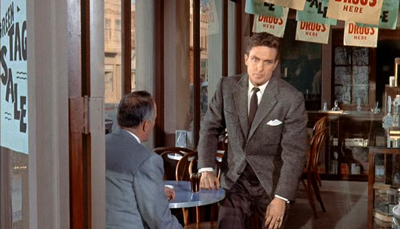
That's good enough for a nomination, but Dorothy Malone actually went home with a gold statue, and that takes a bit more. You couldn't make a Hollywood movie with a character like Marylee in 1956 unless she was going to be shamed, punished, and humiliated (you still can't, for the most part), so Malone has a pretty thankless acting task. But she sells it, at least some of the time. In the scene below, even with the ridiculous dialogue, even with the fact that she's coming on to Rock Hudson (who is playing a ukulele, for God's sake), she's sexier than she has any right to be.
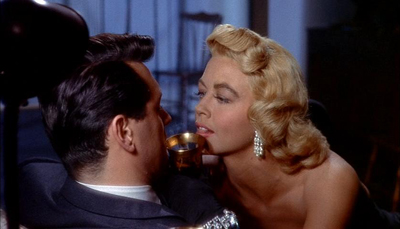
She fares less well when Sirk has her feign sexual ecstasy while remembering Mitch's childhood marriage proposal. Sirk has kid's voices on the soundtrack while Malone bites her lip and writhes.
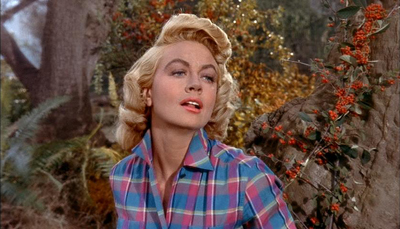
Sarah Bernhardt couldn't make that scene play.
Written on the Wind is directed with a lot less visual precision than All That Heaven Allows, but Sirk still clearly puts more effort into the picture's look than you'd expect in a melodrama. There's a carefully thought-out color scheme by which we can track Lauren Bacall's character, from the beginning where she is closer to Kyle:
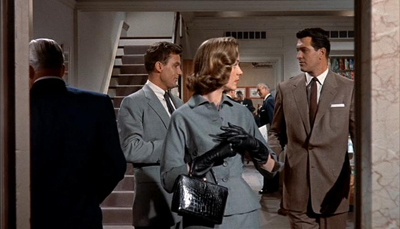
To later scenes when her sympathies lie with Mitch:

Still, there's nothing as disciplined or rigid as the lighting and framing effects of All That Heaven Allows. But that's appropriate, I suppose, because the film is much lighter and faster; anything that felt like a static tableau would slow it down. And both Robert Stack and Dorothy Malone are more fun to watch than anything in All That Heaven Allows (with the possible exception of Jacqueline deWit). So why do I think Written on the Wind is a less successful film? Because there's nothing as great as the television shot I wrote about in All That Heaven Allows.
Actually, that's not entirely true: there is a moment when, in a single shot, Sirk unifies all the themes he's been working with throughout the film. And here it is:
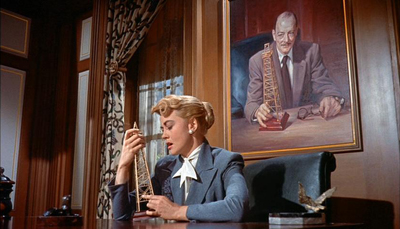
After Marylee loses her father, brother, and Mitch, she sits at her father's desk in a grey suit (her brother's color), caressing a model of an oil derrick. Behind her is a portrait of her father holding the same model, but with an air of confidence and mastery that Marylee lacks. It's all there: Kyle's fears of sterility and impotence, the Hadley children's inability to live up to their father's expectations, and most of all, the fact that Marylee has lost the man she loves, the embodiment of the film's masculine virtues.
But while the shot of Jane Wyman entombed in her television screen was both funny and kind of horrifying, in this case the phallic pun overshadows everything else. Maybe Sirk really did try to make a sincere "film about failure," as he put it. Maybe I'm missing something human and tragic in Robert Stack's performance. And maybe I just can't get past dick jokes. But to me, this film represents the kind of filmmaking Sirk transcended in All That Heaven Allows, what Sarris called a "joke by a fellow sophisticate revenging himself on... a mass audience too naive to realize it was being insulted." I'm okay with that kind of movie. I get the joke. Is that all there is?
Randoms:
- The best hilarious-shot-played-straight in the film happens right after Kyle is told that he may never have children. He leaves the drugstore where he's met the doctor, and has to walk out past a kid maniacally bouncing up and down on a mechanical horse:

- A still doesn't really capture how long the camera lingers on this kid bouncing up and down; Robert Stack earned his Academy Award nomination right there for not cracking up.
- I think Criterion may have erred in choosing All That Heaven Allows and Written on the Wind as their representative Sirk titles. One of the DVD supplements informs me that Sirk also made a film called Sign of the Pagan in which Jack Palance plays Atilla the Hun and, better yet, a 3-D Western starring Rock Hudson a an Apache.


17 comments:
Brilliant as always!
And, though I'm a bit late to the party, very big congrats on the recognition by Roger Ebert. We all know you more than deserve it.
re. Sirk; though it's not easily apparent (nor is the connection really that strong), I always thought that he was something of an American counterpart to Ophuls, given the nature of the subjects they handled, and their high level of formalism. Granted Ophuls and his characters had much more subtlety in their inflections and their actions, respectively, but Sirk's over-the-top nature and almost relentlessness towards his visual style seem somewhat like--to me, at least--an American flavor of the same fundamental attitude from which Ophuls and Sirk drew their films. It's almost certainly not as close as I'm imagining it being, but I think there's at least something there.
Anyway, keep up the good work!
I'm surprised you didn't talk about the fantastic Dorothy Malone dancing in her room scene while the father falls down the stairs. That, too me, makes the movie worth watching it for kitsch value alone. I always figure Sirk knew what he was doing but also what he was up against. I don't count Bacall's reticence as so much a fault as a miscalculation just how exuberant Malone would be.
Matthias,
Thanks, man! Interesting, re: Ophuls; I will confess that all I know of his films is James Mason's couplet:
A shot that does not call for tracks
Is agony for dear old Max.
I'll watch him post-haste, any suggestions on where to start?
Emily Jane,
I love that scene, meant to talk about it in a bullet point about being unable to look at Robert Keith without thinking of the Twilight Zone episode "The Masks," then completely forgot. I'll add it tonight.
And yeah, no one could have predicted Dorothy Malone's performance. Bacall does all right in the scene where they confront each other shortly after she's married, but otherwise it's Malone's movie.
Ophuls' best is "Earrings of Madame de…" Criterion #445, but "La Ronde," #443, is a great fun, and "Le Plaisir," #444, is quite wonderful too.
Keep Kubrick & Scorsese in the back of your mind as you watch Ophuls move the camera.
Add in some of his American films: Letter from an Unknown Woman above all (it's very much of a piece with the 3 films in the Criterion collection), though The Reckless Moment and Caught are also excellent.
I also like Liebelei, though good luck finding it.
Wow!
It's always nice to see other Ophuls fans.
In any case: sorry about getting back to you so late (I read your essay at work).
The film where Ophuls is at his most semiotic (and Sirk most definitely is) would probably be The Earrings of Madame De... It has the most straight images of any Ophuls film (more or less, they're meant to flow without interruption), and is, as Andrew Sarris would corroborate, a wonderful confluence of virtually everything Ophuls did before.
The main link that I see is that they both cared about women who are trapped (one of Ophuls's films was almost literally about such a thing, and its title was unsubtly called Caught), and as you have shown in your All That Heaven Allows criticism, is something that Sirk articulated brilliantly, and identified with. Madame De... is similarly about a woman who becomes trapped with a lover, but the mechanics and the externalization of it are different, hence my thought that Sirk and Ophuls--for all that they share--can differ greatly stylistically.
Or I could be full of it, and the connection is not as strong as I thought to myself that it was.
Anyway, keep up the good work, and happy viewing.
If you really are interested in non-weepy Sirk, check out Shockproof. It's essentially your basic film noir, with the kicker that it was scripted by Sam Fuller. Sony just released it on their Fuller boxset.
Wow! This blog is really buzzing now. Congrats again. Your readership just got a huge upgrade.
Yes WOTW is totally Malone's film. Its been a while since I last watched it. Bu I remember that I didn't like how Sirk set up his story as much as how he ended it. The scene with the fake pond is hysterical, Joan Crawford material. Did Sirk ever work with Crawford? I'll be googling this. But really, Criterion needs to issue Johnny Guitar. Shawn McGuire
Came across your blog from an article on IFC's website.
Fantastic stuff! I look forward to reading the archives...
I decided today while browsing the Criterion Collection rack at a local record store that I'd endeavor to watch the entire list in numerical order and write about it. Coming upon your blog tonight I see that my idea wasn't such an original one. Oh well, I still plan on giving it a shot.
Anyway, great blog.
Sirk and Ophuls to me have very little in common, though Sirk did do one movie, There's Always Tomorrow (just came out on Masters of Cinema) that plays almost like a reinterpretation of an Ophuls movie, The Reckless Moment, which is sort of a domestic noir and perhaps Ophuls's best American film. In very broad terms they do have a bit in common, they're both arguably feminists, they both make movies about trapped women - but I think that Sirk is much more of a moralist and much more judgmental of the characters doing the trapping, whereas Ophuls is in love with all of his characters. He's a feminist but he's resigned to the fate of the women in his films and even sees a sort of beauty in it. (The one Ophuls film I've seen where he's a bit more moralizing, Caught - sort of Citizen Kane if Kane had been centered around Kane's second wife - never feels very Ophulsian.) And I think that their differences in style flow, in part at least, out of their difference in worldview. Sirk uses color and light and overt symbolism and montage to drive his points home, Ophuls films everyone with the same beautiful moving camera because he's a humanist.
Written on the Wind may be my favorite Sirk film, precisely for the reasons that Matthew disdains it. Surely you don't think that all the misfires you read in the film were beyond Sirk's comprehension? Trust me--well trust Sirk--every moment of inept overacting was part of Sirk's strategy. For example, you point out how dull Hudson's and Bacall's characters are. Note also how dull their costumes tend to be in comparison to the siblings': Sirk gives all the color in the film to Malone and Stack, making it pretty clear where his attention lies. It's a pretty subversive approach for 1956: for a director to be more sympathetic toward the characters that any other director would be explicitly condemning than he is to the characters who hew more to societal expectations. If you watch Written on the Wind from that perspective--that it's almost a celebration of the kind of individualism portrayed by the siblings--every choice that upon first viewing seems inappropriate or artistically naive falls into place. Written on the Wind is an mock-operatic indictment of American conformity, offered to the masses as precisely the opposite.
Charley,
I wouldn't say I dismissed it! I didn't like it as much as All That Heaven Allows. That's a pretty high bar to set.
There are days when All That Heaven Allows is my favorite too. But it's so much more serious. To borrow Beethoven's description of his Eighth Symphony, Written on the Wind is more "unbuttoned." For similar reasons, The Birds is usually my favorite Hitchcock: Hitchcock was always so cold an clinical, but The Birds is an uncontrolled splat of sexual hysteria.
--oh and, the best thing about that scene where Stack leaves the doctor's office after having been told he's incapable of fathering children and is brought up short by the sight of the child? Look at his line of sight. He's not looking with envy at the child. He's looking at the throbbing hugeness between the boy's legs. That's where his envy is focused.
Thank you very much sharing this information with us,. This post describes the cine field artists how much strain they got.
Post a Comment